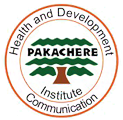About this Project
Launched in 2010, the Tsogolo Langa – My Future! project worked to promote girls education in the Zomba district in Malawi. The project intended to increase retention of girls in primary schools by increasing awareness of girls’ right to education amongst girls and mothers, increasing efficacy among primary school girls to claim their right to education, and increasing active support by traditional leaders, religious leaders, school management committees, and parents.
The project was led by Pakachere Institute of Health and Development Communication (IHDC) in partnership with Swedish Organization for Individual Relief (SOIR). The project used a three tiered approach which included mass media, community mobilization, and grass-root advocacy.
Communication Strategies
A key part of the project was the production and airing of Tsogolo Langa (My Future!), a 30- minute radio magazine programme that featured experiences of young girls and the challenges they face in accessing education. It also featured parents, traditional leaders, gender and education experts who debated on some of the community and structural level factors that affect access to education by the girl child.
Community mobilization included the establishment of 48 radio listener clubs for girls and mothers from 24 primary schools. The girl clubs had on average 25 members each and were supervised by female teachers. The mother groups comprised of 10 women who operated on a volunteer basis. Each group had trained facilitators and a wind up radio. They met once a week after school to listen to the programme and hold facilitated discussions. After each discussion, they agreed on an action point, which was an activity that the group implemented to actively promote girls education in their specific communities.
Complementing the mass media strategy and community mobilization activities by radio listener clubs were quarterly advocacy meetings. These were used to mobilise support from traditional leaders, religious leaders, school management committee members, parent-teacher association members, headmasters and parents to be actively involved in girl’s education within their communities. In these dialogue sessions, participants mapped out key issues that affect girls’ education in their communities and formulated action plans of how they would go about addressing the barriers.
The project was part of a larger gender programme by SOIR which was working to contribute to the reduction of gender inequalities in education through the promotion of girl’s education.
Development Issues
Education, Gender Inequality
